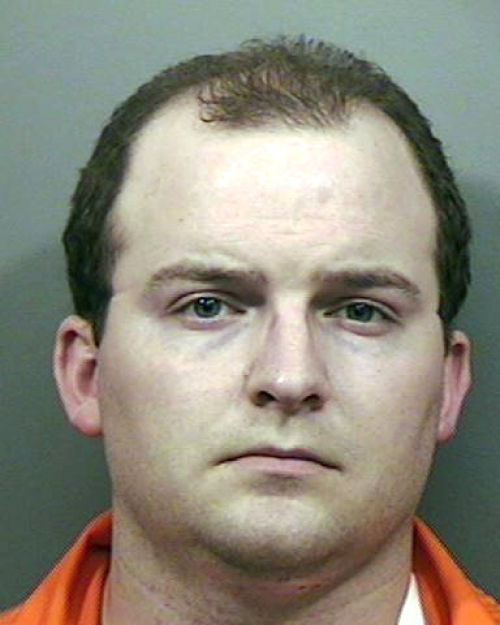
Ricky James Pellegrin
December 17, 2013
Anna Marie Reed
December 26, 2013As some of the women he held hostage and raped 17 years ago and the parents and daughter of the woman he killed looked on, Chad Roy Louviere watched intently as a former girlfriend detailed their brief relationship in a Terrebonne Parish courtroom last week.
Testimony from Melissa Blair, who once lived in Houma but now calls Knoxville, Tenn., home, appeared initially as recitation of pillow talk and recollection of her window into the life of a former law enforcement officer who currently faces death for crimes committed on Oct. 17, 1996.
In reality it is the first component of the legal scaffolding on which Louviere’s attorneys will hang their case, a presentation expected to take many months of disjointed, weeks-apart sessions in District Judge Johnny Walker’s courtroom.
The facts of the case are not in dispute. On that sunny autumn day Louviere, in uniform and in his marked Terrebonne Parish Sheriff’s Office patrol car, pulled over a motorist on Bull Run Road, handcuffed her, brought her to a cane field in the police car and raped her multiple times. After returning her to her vehicle he drove to what was then a branch of ArgentBank on Grand Caillou Road, where his estranged wife worked. Louviere entered the bank with firearms, including a rifle, took female employees hostage, including his wife, shot and killed Pamela Ann Duplantis, a teller, and then during a 25-hour siege raped the other women and forced them to suffer various other indignities.
He pleaded guilty to first-degree murder and threw his fate on the mercy of the jury, who heard testimony on whether he should live or die, and they chose the latter. After years of delay, mostly due to funding and scheduling problems, his bid for post-conviction relief is now being heard before Walker.
Prosecutors and defense lawyers alike expect that no matter what Walker decides on the question of whether Louviere should have a new trial, that decision will be appealed by one side or the other. And because several of the questions raised center on constitutional issues, the case in all likelihood will end up in the federal courts.
Louviere’s attorneys allege that he was not competent to enter a guilty plea to first-degree murder before former Judge Edward J. Gaidry, and that his attorneys at the time gave bad advice. The record shows that attorneys never sought a competency hearing; the defense team now says that Louviere’s original lawyers should have been able to argue that he did not intentionally shoot Duplantis, and that even if he did, Louviere was not sane at the time the crime was committed.
Various witnesses, the attorneys allege in legal filings, were not called to testify to Louviere’s state of mind. They also never had the chance to tell their stories to doctors who might have made a case for mercy based on his alleged insanity.
Former girlfriend Blair is one of those.
During the 2 ½ hour hearing the afternoon of Dec. 11, under questioning from defense lawyer Caroline Tillman, Blair spoke of meeting the young deputy while she worked in a Houma convenience store, not long after a man killed his wife there and then himself.
The Chad Louviere she met was courteous and respectful and the two became very close, very quickly, mere weeks before the bank rampage.
“We spent a lot of time together, if I wasn’t working or he wasn’t working,” Blair said.
There was a lot of common ground for them, according to the testimony. He was a deputy in Terrebonne. She was a reserve deputy in Lafourche Parish. Both were undergoing difficult divorces. Louviere, Blair testified, was affectionate and attentive.
At one point in the relationship, the deputy and the reserve cop were thumbing through crime scene books with disturbing pictures of “tragic events.”
The discussion turned to a helicopter crash, the same one Louviere had responded to that attorneys have said traumatized him.
“It was the first time I saw him stone-faced that way,” Blair said. “A total change to his appearance and attitude. He said ‘I worked it, it’s off the subject, we are not going to talk about it anymore.’”
Asked about Louviere’s attitude toward his job, Blair responded that “he was OCD about everything having to do with his job. He would write me a ticket, or write and hand his mom a ticket. Then I found out he had written a ticket to the Thibodaux police chief’s wife.”
Louviere had served as a City of Thibodaux police officer before taking the job with Terrebonne.
Doskey objected to the use of the acronym OCD by Blair – the letters stand for obsessive-compulsive disorder, a psychiatric condition – and Walker sustained her objection. He told Doskey he would not be interpreting her colloquial use of the medical terminology as a diagnosis.
“He talked about wanting me to move in with him,” Blair further testified. “He wanted to get me a Dillard’s card and he would pay for the bill.”
The Dillard’s card conversation, she said, related to Louviere’s disapproval of some of her clothing choices.
Those were among the reasons, Blair said, that she wanted to slow things down.
“It was comfortable in the way he treated me,” she said. “But uncomfortable in that he moved so quickly. It’s not that I was ending the relationship, I wanted it to be at a normal pace.”
That conversation, she said, took place the night before the hostage standoff.
Blair did not offer opinions as to how her recollections of Louviere relate to the issues at bar, nor was she asked her opinion.
During her testimony, Louviere occasionally wrote notes to his attorneys. He appeared to make eye contact with Blair on several occasions.
Louviere, who is on death row in the Louisiana State Penitentiary at Angola, was wearing a remotely controlled electric stun belt during the proceedings. His lawyers asked Walker to have it removed, but the judge responded that with victims and witnesses so close to the defendant in the small courtroom, he would not do so.
Such belts, according to Amnesty International, deliver as much as 50,000 volts for eight seconds, at a current of 3 to 4 milliamperes, pulsed at 17 to 22 pulses per second, thus causing intense pain.
Their use in courtrooms is outlawed in some jurisdictions. The human rights organization considers them a form of torture.
Louviere is considered a high security risk, having taken a guard hostage while held at the Lafayette jail prior to his initial trial.
Doskey asked minimal questions of Blair during her cross-examination.
After the hearing, Louviere was led away; Walker set Feb. 5 as a date for conference with attorneys, and hearing dates of Feb. 24 and Feb. 25 for the continued proceedings.













